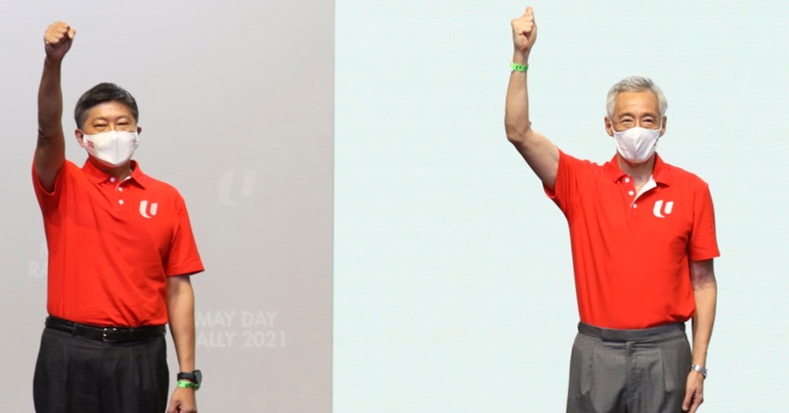Ng Chee Meng, secretary-general of the National Trades Union Congress (NTCU), called for "universal PWM" for all lower wage workers during his May Day speech on May 1.
PWM stands for progressive wage model, which is unique to Singapore and aims to help increase wages of workers through upgrading skills and improving productivity.
Addressing an audience of labour movement members, including Prime Minister Lee Hsien Loong and his wife, Temasek CEO Ho Ching, Ng said that NTUC is working to "narrow the income gap", increase social mobility and "co-create" more opportunities for vulnerable workers to progress.
Ng said:
"NTUC, in this aspect, will therefore push for quicker roll-out of the Progressive Wage Model for lower wage workers. We are working hard with SNEF and MOM in the tripartite workgroup for lower-wage workers, to formulate new PWMs in the Food Services, in the Retail Trade sectors."
He added that good wages and work prospects for lower-wage workers increases productivity, which in turn boosts a company's profitability, in a pointed reminder for capital.
NTUC foundation S$250 million cash injection
Ng acknowledged that during economically-difficult years, such as the present due to Covid-19, NTUC's initiatives to provide financial assistance to those in need get strained.
Although generous donors like the Singapore Labour Foundation, affiliated unions and private companies chip in, their finances get strained too.
To alleviate this, Ng announced the founding of the NTUC foundation, kicking off with a cash injection of S$250 million to help NTUC carry out its welfare work.
Ng said:
"The aims of the Foundation are clear. Whether it is welfare, working conditions or the social economic status of our members, we will support these. We want to give hope to members through programmes which have social resonance and impact."
Past successes, future goals
Ng recounted some of NTUC's successes during the tough preceding year.
FairPrice ensured that supplies of essential items, such as rice and oil, were readily available on the shelves.
The National Wages Council was convened twice, with NTUC drafting the Fair Retrenchment Framework to help workers who were laid off.
Ng credited Singapore's tripartism for keeping resident unemployment rates below 5 per cent, and steadying things until Singapore could make a recovery.
However, NTUC needs to look ahead.
Ng said that the economy and the nature of Singapore's workforce is rapidly changing, and rapidly ageing, with more professionals, managers and executives (PMEs).
To be a better voice for the labour movement, NTUC is looking to recruit more PME members and help them adjust to the changing economy.
"NTUC wants to help in this space. We want to provide assurance to support PMEs who may one day become displaced. We want to help mature PMEs who are displaced, to find meaningful work. We also want to push for a more level playing field for local workers to be duly recognised for their skills and abilities.
But as I’ve done in the media in the last couple of days, I need to make an appeal – NTUC can only help if our PME sisters and brothers join us, and co-create this journey together."
Workers like freelancers and food delivery riders can also join, and make use of the NTUC's various training schemes, with the NTUC aspiring to be their voice to secure fairer treatment.
Ng concluded his speech on the 60th anniversary of the founding of the NTUC by saying:
"We are determined to keep innovating and evolving so that we can stay relevant to members and workers alike, so that we can stay relevant to employers and the government alike. While we keep an eye out for members first, workers will always be at the heart of all that we do."
Related story:
Top image from NTUC.
If you like what you read, follow us on Facebook, Instagram, Twitter and Telegram to get the latest updates.
